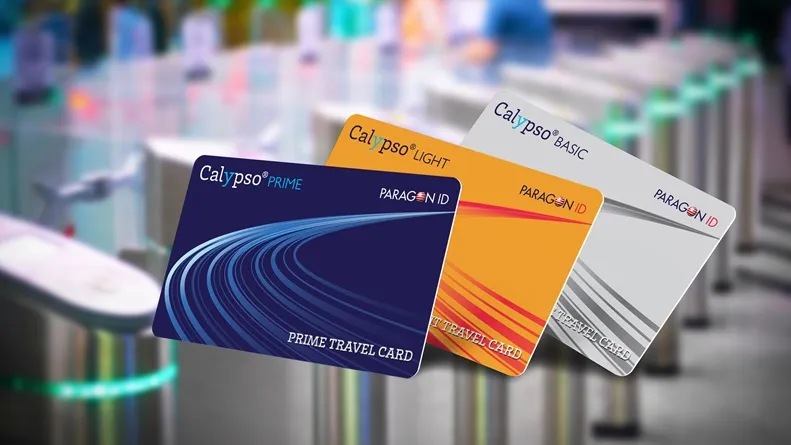Why Calypso remains a key standard for public transport
Built on open, secure, and interoperable technology, they offer transport authorities a long-term solution that balances passenger needs with operational efficiency.
Interoperability that simplifies travel
One of the strongest advantages of the Calypso standard lies in its seamless interoperability. Calypso smartcards & tickets can be used across multiple transport operators and modes, even in complex urban or regional networks. This means that a single card can provide access to buses, metros, trams, trains, and even intercity routes—making multi-modal journeys easier to manage for passengers. For operators, this interoperability helps support integrated mobility strategies and encourages the use of public transport by simplifying the travel experience.
Security that inspires confidence
Security is a top priority in modern ticketing systems, and Calypso delivers robust protection through its embedded microprocessor technology. Every card is equipped with secure cryptographic protocols that protect transaction data and passenger identities. This strong, hardware-based security reduces the risk of cloning, fraud, or data breaches. As a result, Calypso smartcards are trusted by some of the world’s most demanding transport networks. For operators, this level of assurance reinforces system integrity while building trust with users.
Fast, contactless boarding
Speed and ease of use are essential in busy public transport environments. Calypso smartcards provide instant, contactless validation, enabling passengers to simply tap and go—whether using a physical card or a mobile device with NFC technology. This significantly reduces boarding times and limits congestion at access points, particularly during peak hours. The result is a smoother flow of passengers, reduced dwell time at stops and stations, and a better overall travel experience. For operators, faster boarding contributes to better on-time performance and higher system throughput.
Flexible ticketing for all passenger profiles
Today’s passengers expect flexible ticketing solutions tailored to their habits. Calypso supports a wide range of fare structures, from single-use and time-based tickets to multi-modal passes and pay-as-you-go accounts. These can be issued on various media—including durable plastic cards, eco-designed paper cards like Calypso Light, or fully digital formats integrated into mobile apps. This adaptability allows transport authorities to cater to different user profiles—daily commuters, tourists, or occasional riders—while optimising revenue management and system accessibility.
Remote reloading and mobile integration
Convenience goes beyond the journey itself. Calypso smartcards support remote reloading through mobile apps, online portals, and self-service kiosks. Passengers can top up their cards, renew passes, or check balances without needing to visit a ticket office or handle cash. This feature improves customer satisfaction and streamlines operations. During the COVID-19 pandemic, the ability to reload and manage tickets remotely proved particularly valuable by reducing physical contact and queues in stations—benefits that remain relevant in a post-pandemic world.
Sustainable and cost-efficient
Sustainability is now a central concern for transport authorities. Calypso supports this goal with recyclable and reusable smartcard options, including paper-based alternatives that reduce dependence on PVC and plastic. These cards not only help limit environmental impact, but also offer a more economical choice over the card’s lifecycle. By extending card usability and offering lighter, greener alternatives, transport networks can align their ticketing strategies with broader environmental objectives, such as carbon footprint reduction and circular economy policies.
Open standard, competitive supply
Unlike proprietary solutions, the Calypso standard is open and non-exclusive. This allows transport agencies to select from a range of suppliers for cards, readers, and back-office systems, based on cost, performance, or innovation. The result is a more competitive procurement process, reduced dependence on a single vendor, and the freedom to scale or upgrade systems over time. For public operators, this model encourages innovation, keeps costs under control, and avoids the long-term risks associated with vendor lock-in.
Future-Ready Infrastructure
Although Calypso is a mature technology, it is anything but static. The standard is continuously updated and designed to integrate with new mobility and payment technologies. This includes Account-Based-Ticketing (ABT) , digital wallets, and even biometric authentication—ensuring compatibility with emerging trends in urban mobility. For transport authorities, this future-ready approach offers peace of mind: infrastructure investments made today will remain relevant and adaptable for years to come.
Conclusion
Calypso smartcards have become a reference in secure, flexible, and interoperable ticketing. They are used in many cities across the world including Paris, Lyon, Marseille, Brussels, Montréal, Milan, Rio and Mexico. Their widespread adoption reflects a proven ability to meet the operational challenges of today’s transport networks while supporting tomorrow’s mobility goals. For public authorities and transport operators, Calypso offers a long-term, scalable solution that delivers value for both users and systems.
Paragon ID is proud to support cities and operators worldwide with Calypso-certified cards and services, tailored to meet the unique demands of each network. Calypso standards and operability are also included in our Open Ticketing Platform offering .


